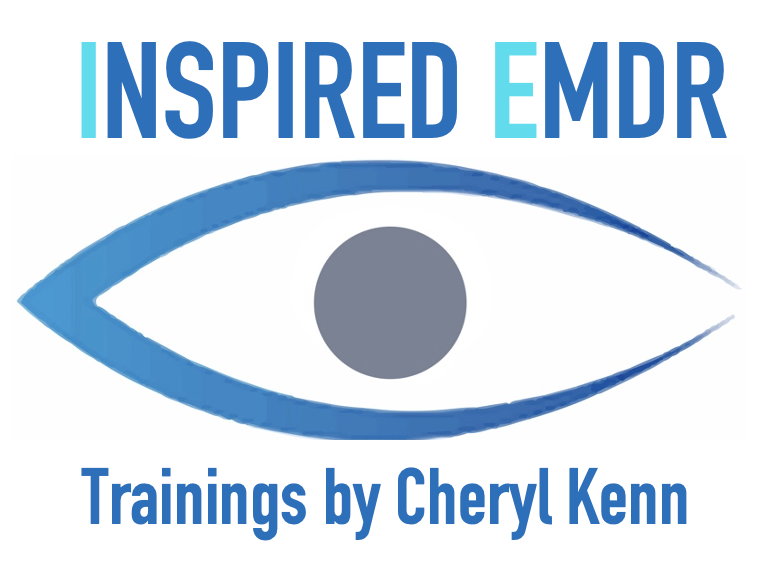

Inspired EMDR’s EMDR Therapy Basic Training is a comprehensive, interactive, and structured course that will allow you to become familiarized with the necessary skills, procedures and principles of EMDR Therapy so that you may confidently and successfully begin applying it in your practice. EMDR Therapy is a standardized treatment that is used world-wide. It is an evidence-based psychotherapy for the treatment of PTSD and trauma-related problems, including but not limited to wide range of mental health issues, such as depression, anxiety, phobias, low self-esteem, persistent grief, addictions and compulsions, somatic responses related to illness and injury, and relationship difficulties.
The training is based on the foundational teachings of the originator of EMDR therapy, Francine Shapiro, PhD. Participants will understand and practice core EMDR Therapy skills and procedures and will have the ability to expand these skills for use with a wide range of clinical presentations and situations. Upon fulfillment of the course requirements, Inspired EMDR and the EMDR International Association will provide a certificate documenting that the training participant has completed Basic Training in EMDR. The Americans with Disabilities Act (ADA) prohibits discrimination and ensures equal opportunity for persons with disabilities. Cheryl Kenn is responsible for ensuring that facilities and reasonable accommodations are accessible to those with disabilities.
Questions about EMDR Trainings? Please email me at ckennlcsw@gmail.com
Training Highlights & Eligibility
Why is this training unique? Inspired EMDR’s training is designed to makes learning EMDR personalized, comprehensive and practical so that you can apply your newfound skills to your work immediately. A low trainer-trainee ratio (9-18 participants) combined with ample practice time gives you a solid foundation as taught by an experienced trainer. Bonus! – 10 hours of Consultation are embedded in the training at no extra cost. Cheryl brings comprehensive instruction, individualized support and experienced guidance throughout all training days and consultation meetings. The individualized instruction brought to you at a manageable pace gives you ample time to absorb new knowledge with minimal disruption to your schedule, giving you a more optimized learning experience.
This EMDR Basic Training Course is offered in-person or virtually
- 8 days of training / in four 2-day parts /across 3 months
- 51.5 total hours:
- 20 hrs. of didactic instruction
- 21.5 hrs. of small-group supervised practice
- 10 hours of case consultation embedded in the training at no additional charge.
- The 51.5 hour course exceeds the approved standards of EMDRIA (EMDR International Association) .
- Scripts, handouts and all materials for the training, will be made available to you through an LMS.
- 40.5 CEs are included at no additional charge
Completion Requirements:
- Completing all days in the 8 day training, comprised of lecture, practice and consultation
- Reading EMDR: Basic Principles, Protocols and Procedures (Shapiro 2017) and other readings provided to you.
- Attendance is mandatory at all sessions. Partial credits will not be given
Eligibility Requirements: EMDRIA Guidelines determine who can attend.
Mental health professional licensed for independent practice, or who are on a licensing track under the supervision of a licensed supervisor.
- Social Workers
- Mental Health Counselors
- Marriage and Family Therapists
- Psychologists
- Psychiatrists
- Psychiatric APRNs
- Clinicians with Masters Degrees pursuing licensure with their state board, under the guidance of a clinical supervisor, who will submit a letter of status confirmation.
- Interns/Graduate students who have completed their core coursework (2nd year students) and are in a practice setting under the guidance of a clinical supervisor, who will submit a letter of status confirmation.
Overview, CEs, Tuition
Training Overview
- Gain knowledge about the foundational principles of EMDR as a complete psychotherapy approach.
- Apply the Adaptive Information Processing Model of EMDR Therapy as a basis for treating a wide range of clinical issues and situations, including acute trauma, recent traumatic events, PTSD and more complex cases including complex trauma.
- Apply EMDR therapy in a variety of presentations, including working with couples, children and clients presenting with addictions, phobias, somatic conditions, traumatic grief and for first responders or those exposed to combat trauma
- Identify and apply adaptations, through an anti-racist focus, in order to address culturally informed trauma and adversity.
- As a new EMDR clinician, receive individualized support to effectively weave EMDR into one’s clinical practice with other contemporary treatment paradigms including: psychodynamic, cognitive-behavioral and other systemic approaches while comfortably integrating EMDR into ongoing work.
Rate: $1500 for training and 10 hours of consultation
Refresher: $750 for didactic portion only
Didactic learning: 20 hours
Practicum learning: 21.5 hours
-
- Consultation: 10 hours
- Training Total: 51.5 hours
- Total CE Credit 40.5 hours Approved by:
- American Psychological Association
- NASW-CT
- 51.5 EMDRIA Credits
Course Objectives
8 Total Days of Training: 40.5 CEs and 51.5 EMDRIA Credits
- 20 hrs. of Lecture, 21.5 hrs. of Practice and 10 hrs. of Consultation
Part 1: Day 1 & 2
- Describe the foundations of the Adaptive Information Processing theory of EMDR Therapy
- Be aware of the theoretical, research issues and the neurobiological effects of trauma on the brain, including the clinical determinants of Traumatization and PTSD
- Establish knowledge about the historical development of EMDR Therapy
- Assess client readiness for use of EMDR Therapy
- Use the target sequencing plan to identify memories for reprocessing
- Apply the Safe-Calm Place/State
- Apply Resource Development and Installation
- Identify other techniques and safeguards for emotional stabilization and containment
Part 2: Day 3 & 4
- Acquire skill in applying the procedural steps of Reprocessing.
- Further identify methods for accessing memory networks.
- Be able to identify and address blocking beliefs and feeder memories
- Conceptualize a case through the AIP model
- Identify the three prongs of the EMDR standard protocol
- Establish techniques to help clients modulate affect in and between sessions
- Develop skill in applying eight phases of the EMDR Therapy treatment method
- Engage in on-going case consultation
Part 3 – Day 5 & 6
- Establish knowledge of further strategies to facilitate reprocessing including addressing looping, resistance and client defense
- Identify and address therapeutic and cognitive interweave
- Identify special protocols to apply to specific patient populations and clinical presentations
- Demonstrate proficiency in applying the eight phases of EMDR Therapy
- Engage in on-going case consultation
Part 4 – Day 7 & 8
- Expand concepts behind constructing the Cognitive Interweave.
- Demonstrate proficiency in applying EMDR for present triggers and future desired outcomes
- Establish a knowledge base of the special clinical issues that present with adult survivors of childhood abuse and neglect.
- Describe modifications of the protocol for complex trauma & dissociation
- Apply specific interventions to establish and maintain client safety for clients presenting with dissociative phenomena
- Identify strategies for case conceptualization for the completion of treatment before termination.
- Engage in on-going case consultation
Upcoming Training Dates
UPCOMING TRAININGS:
SPRING HARTFORD 2025 (TBA)
EMDR Basic Training, In Person Hartford, CT 2025 – Catholic Charities 45 Wadsworth St.
9:00 am – 5:00 pm ET, *dismissal on Day 8 is at 4:30 pm
- Part 1: Day 1 & 2 April 7-8 (Mon-Tue)
- Part 2: Day 3 & 4 April 16-17 (Wed-Thu)
- Part 3: Day 5 & 6 May 20-21 (Tue-Wed)
- Part 4: Day 7 & 8 June 17-18 (Tue-Wed) *On Zoom
FALL 2025
EMDR Basic Training, In Person Branford CT 2025 – The Center for Neuropotential 144 N. Main St.
9:00 am – 5:00 pm ET, *dismissal on Day 8 is at 4:30 pm
- Part 1: Day 1 & 2 SEP 6-7 (Sat-Sun)
- Part 2: Day 3 & 4 SEP 20-21 (Sat-Sun)
- Part 3: Day 5 & 6 OCT 18-19 (Sat-Sun)
- Part 4: Day 7 & 8 NOV 14-15 (Fri-Sat) *On Zoom
EMDR Basic Training, Virtual 2025
9:00 am – 5:00 pm ET, *dismissal on Day 8 is at 4:30 pm
- Part 1: Day 1 & 2 SEP 11-12 (Th-F)
- Part 2: Day 3 & 4 SEP 29-30 (M-Tu)
- Part 3: Day 5 & 6 OCT 27-28 (M-Tu)
- Part 4: Day 7 & 8 NOV 20-21 (Th-F)
Inquires? Please email Cheryl ckennlcsw@gmail.com